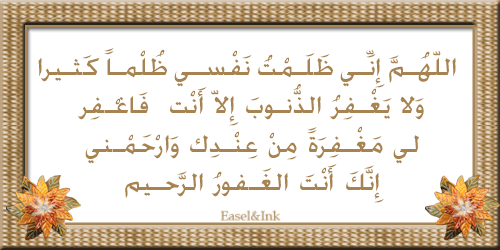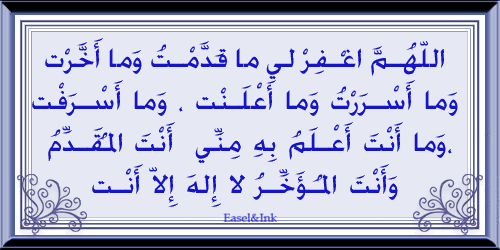 Lesson Nine
Lesson Nine
An Explanation of the Tashahhud 
The Tashahhud is to say, "Greetings to Allah, and blessings and goodness. Peace be upon you, 0 Prophet, and the mercy of Allah and His blessings. Peace be upon us and all of Allah's righteous servants. I bear witness that none has the right to be worshipped except Allah and I bear witness that Muhammad is His servant and Messenger. "
Then the worshipper sends peace and blessings upon the Prophet (Sallallahu Alayhi wa Sallam) saying, "0 Allah, bestow Your favor on Muhammad and on the family of Muhammad as You have bestowed Your favor on Ibrahim and on the family of Ibrahim, You are full of praise, Most Glorious. 0 Allah, bless Muhammad and the family of Muhammad as You have blessed Ibrahim and the family of Ibrahim, You are full of praise, Most Glorious."
Then in the final Tashahhud, which is in the last unit of prayer, the worshipper seeks refuge in Allah from four: from the punishment of the Fire, from the punishment of the grave, from the trials of life and death, and from the evil trial of Al-Masih Ad-Dajjal. And then finally, one may supplicate as he wishes, but especially using those invocations that have been related from the Prophet (Sallallahu Alayhi wa Sallam), such as the following: "0 Allah, help me to remember You, to give You thanks, and to be Your good servant. 0 Allah, I have greatly wronged myself and no one forgives sins but You. So grant me forgiveness and have mercy on me. Surely, You are Most Forgiving, Most Merciful."
As for the first Tashahhud (which is in the second unit of prayer), after having said, "I bear witness that none has the right to be worshipped except Allah and I bear witness that Muhammad is His servant and Messenger," one rises to the third unit - in the Dhuhr, 'Asr, Maghrib, and 'Isha' prayers. But because there are Ahadith, which in general, indicate that one should send peace and blessings upon the Prophet (Sallallahu Alayhi wa Sallam) it is better for one to send peace and blessings upon him and then to rise to the third unit of prayer.
The Tashahhud: The Shaikh chose the Tashahhud that was related by Ibn Mas'ud (Radhi Allahu Anhu), who said, "When the Messenger of Allah (Sallallahu Alayhi wa Sallam) taught me the Tashahhud, my hands were clenched in his, in the same way that he would teach me a Surah of the Qur'an." (Recorded by Ahmad (1:114) Al-Bukhari (4:175) Muslim (2:14) and others.) Yet there are other wordings to the Tashahhud: whichever one the worshipper chooses, his prayer is correct. If he varies, using this one sometimes and that one others, then this is good. And Allah Almighty knows best. Nonetheless, among the different narrations regarding the Tashahhud, Ibn Mas'ud's narration is most authentic.
Abu Mas'ud Al-Badri (Radhi Allahu Anhu), related that Bashir bin Sa'd asked, "0 Messenger of Allah, Allah ordered us to send blessings upon you, so how should we send blessings upon you?"
At first, the Prophet (Sallallahu Alayhi wa Sallam) remained silent, and then he said:
Say: "0 Allah, bestow Your favor on Muhammad and on the family of Muhammad as You have bestowed Your favor on the family of Ibrahim, and bless Muhammad and the family of Muhammad as You have blessed the family of Ibrahim from all that exists, You are full of praise, Most Glorious ... And Taslim , is as you know." (Recorded by Muslim) Both Al-Bukhari and Muslim related another narration, which is narrated by Ka'b bin 'Ujirah (Radhi Allahu Anhu). In it, the Prophet (Sallallahu Alayhi wa Sallam) said:
Say: "0 Allah, bestow Your favor on Muhammad and the family of Muhammad, as You have bestowed Your favor on Ibrahim and the family of Ibrahim. Verily, You are full of praise, Most Glorious ... And he mentioned the rest of the Hadith. Recorded by Al-Bukhari (3:15) and Muslim (2:16) Abu Hurairah (Radhi Allahu Anhu), narrated that the Messenger of Allah (Sallallahu Alayhi wa Sallam) said:
When one of you says the Tashahhud, he should seek refuge in Allah from four, saying, "0 Allah, I seek refuge in You from the punishment of the Fire, from the torment of the grave, from the trials and tribulations of life and death, and from
the trial of Al-Masih Ad-Dajjal." This Hadith indicates that after one sends peace and blessings upon the Prophet (Sallallahu Alayhi wa Sallam) one should seek refuge in Allah Almighty from the four mentioned above.
In another narration, Abu Bakr (Radhi Allahu Anhu) related that he said to the Messenger of Allah (Sallallahu Alayhi wa Sallam) "Teach me a supplication that I can use in my prayer." He (Sallallahu Alayhi wa Sallam) said:
Say: "0 Allah, I have greatly wronged myself and no one forgives sins but You. So grant me forgiveness and have mercy on me, Surely, You are Most Forgiving, Most Merciful." (Agreed upon) This Hadith clearly proves the categorical permissibility of supplication during prayer: one of the times to supplicate during prayer is at the end of the Tashahhud - after one has already made the Tashahhud, has sent peace and blessings on the Prophet (Sallallahu Alayhi wa Sallam) and has sought refuge in Allah from the four above-mentioned afflictions. And it is okay to choose another supplication that has been related from the Prophet (Sallallahu Alayhi wa Sallam) for he said in Ibn Mas'ud's narration:
Then he may supplicate with that invocation that is most beloved to him. And this Hadith indicates even more: that not only is it permissible to supplicate with an invocation that has been related from the Prophet (Sallallahu Alayhi wa Sallam), but it is also permissible to supplicate with any other invocation, as long as the invocation does not consist of that which is prohibited. In yet another narration, the Prophet (Sallallahu Alayhi wa Sallam) said:
Then let him choose to ask whatever he wishes.
One of the supplications that can be said after the Tashahhud is the following recorded by Muslim and Abu 'Awanah:
O Allah, forgive me for those sins which have come to pass as well as those which shall come to pass, and those I have committed in secret as well as those I have made public, and where I have exceeded all bounds as well as those things about which You are more knowledgeable. You are Al-Muqaddim (the First) and Al-Mu'akhkhir (the Last). None has the right to be worshipped except You. The Imam may make these supplications as long as it does not become burdensome on those that are following him in prayer.
You may pray for a specific person, just as the Prophet (Sallallahu Alayhi wa Sallam) supplicated for the weak from Makkah.
At-Tabiyyat means everything that indicates the glorification of Allah, such as bowing and prostrating. And every¬thing by which Allah is glorified belongs to Him alone; if one performs anything that is solely for Allah's glorification to anyone else, then he is a polytheist, a disbeliever.
As-Salawaat means all supplications, though it has been said to mean the five prayers.
At-Tayyibatu Lillah means all good deeds.
Allah is glorified, but peace is not sent upon Him, because by seeking to send peace upon someone, one is making supplication. Allah is pure and good and He doesn't accept sayings or deeds unless they are good and pure.
As-Salamu 'Alaika Ayyubannabiyyu wa Rahmatullahi wa Barakaatuhu means that one is supplicating for peace, mercy, and blessings to be sent on the Prophet (Sallallahu Alayhi wa Sallam) From this, we take a lesson: since we can pray for the Prophet (Sallallahu Alayhi wa Sallam) we cannot pray to him.
As-Salamu 'Alaina wa 'Ala 'Ibaadillahis-Saliheen: Here, you are sending peace upon yourself and upon every righteous servant of Allah, whether that servant be on earth or in the heavens. And again, the fact that we are supplicating for the righteous dearly indicates that we cannot supplicate to them.
Ashhaadu Al-Laa Ilaba Illallilhu Wahdahu Laa Sbareeka Lahu wa Ashhadu Anna Muhammadan 'Abduhu wa Rasooluhu: Here, you bear witness with certainty that no one in the heavens or the earth deserves to be worshipped except Allah Almighty, and that Muhammad (Sallallahu Alayhi wa Sallam) is Allah's Messenger and worshipper - a worshipper is not worshipped, and a Messenger should not be disbelieved in; rather, he should be obeyed and followed. Allah honored the Prophet (Sallallahu Alayhi wa Sallam) by calling him His servant:
Blessed is He Who sent down the Criterion (of right and wrong, i.e., this Qur'an) to His servant (Muhammad (Sallallahu Alayhi wa Sallam) that he may be a warner to the 'Alamin (mankind and jinns). (Surah Al-Furqan 25: 1) Allahumma Salli 'Ala Muhammadin wa 'Ala Aali Muhammadin Kama Sallaita 'Ala Ibrahima Innaka Hameedum Majeed: Salat from Allah means for Him to praise his servant in the highest gathering, as Al-Bukhari mentioned in his Sahih, from Abu Al-'Aliyah, who said "Allah's Salat is His praising His servant in the highest of gatherings." And they say that it means mercy. But the first view is correct. Salat from the angels means for them to ask Allah to forgive His servant. And Salat from human beings means supplication for them.
Aali Muhammad means the family of the Prophet (Sallallahu Alayhi wa Sallam) from the children of Hashim, the children of Al-Muttalib, and his wives. is forbidden for any of them to accept Zakat. And the family of Ibrahim means those believers that are from his progeny.
Just as one can send Salat upon the Prophet (Sallallahu Alayhi wa Sallam) from what has been related, one may also send Salat upon others as well, but as long as one doesn't do so often. It is permissible to send Salat upon other people because the Prophet (Sallallahu Alayhi wa Sallam) did so when he said,
0 Allah, send Salat on the family of Abi A wfa.
But one must not make someone recognized as a person upon whom Salat are sent: that is something specific to the Prophet (Sallallahu Alayhi wa Sallam); nor should one choose a specific Companion or a set of Companions, by sending Salat only on him or on them, leaving out the rest.









 Please check our
Please check our 











